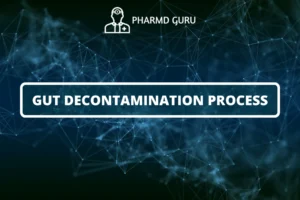Acute poisoning with medications such as paracetamol and salicylates can have serious implications for an individual’s health.
SCROLL DOWN TO THE BOTTOM OF THE PAGE FOR ACTUAL NOTES
TABLE OF CONTENTS:
- Introduction
- Paracetamol Poisoning
- 2.1. Effects of Paracetamol Poisoning
- Salicylate Poisoning
- 3.1. Effects of Salicylate Poisoning
- Clinical Symptoms of Acute Poisoning
- 4.1. Paracetamol Poisoning Symptoms
- 4.2. Salicylate Poisoning Symptoms
- Management of Acute Poisoning
- 5.1. Immediate Actions
- 5.2. Medical Interventions
- 5.3. Supportive Care
1. Introduction
Acute poisoning with medications such as paracetamol and salicylates can have serious implications for an individual’s health. Recognizing the clinical symptoms and understanding the appropriate management strategies for these substances is crucial for timely intervention and ensuring the best possible outcomes. This article provides an overview of the clinical symptoms associated with acute poisoning of paracetamol and salicylates and explores the recommended management approaches.
2. Paracetamol Poisoning
Paracetamol, also known as acetaminophen, is a commonly used over-the-counter pain reliever and fever reducer. While it is generally safe when used as directed, excessive ingestion can lead to paracetamol poisoning, which can cause severe liver damage.
2.1. Effects of Paracetamol Poisoning
Excessive consumption or overdose of paracetamol can result in the following effects:
- Nausea, vomiting, and abdominal pain
- Sweating and pallor
- Loss of appetite
- General malaise or feeling unwell
- Jaundice (yellowing of the skin and eyes) in severe cases
- Hepatic (liver) damage or failure if not treated promptly
3. Salicylate Poisoning
Salicylates are a group of medications that include aspirin and other related compounds. While these drugs have various therapeutic uses, excessive ingestion can lead to salicylate poisoning, which can be life-threatening.
3.1. Effects of Salicylate Poisoning
Salicylate poisoning can lead to the following effects:
- Tinnitus (ringing in the ears) and hearing loss
- Hyperventilation (rapid breathing) and respiratory alkalosis (elevated blood pH)
- Nausea, vomiting, and abdominal pain
- Confusion, dizziness, and lightheadedness
- Sweating and dehydration
- Seizures and coma in severe cases
4. Clinical Symptoms of Acute Poisoning
4.1. Paracetamol Poisoning Symptoms
Acute paracetamol poisoning may present with the following symptoms:
- Nausea, vomiting, and abdominal pain
- Loss of appetite
- General malaise or feeling unwell
- Yellowing of the skin and eyes (jaundice) in severe cases
4.2. Salicylate Poisoning Symptoms
Symptoms of salicylate poisoning may include:
- Tinnitus (ringing in the ears) and hearing loss
- Rapid breathing (hyperventilation)
- Nausea, vomiting, and abdominal pain
- Confusion, dizziness, and lightheadedness
- Sweating and dehydration
- Seizures or unconsciousness in severe cases
5. Management of Acute Poisoning
5.1. Immediate Actions
In cases of acute paracetamol or salicylate poisoning, it is essential to take the following immediate actions:
- Call Emergency Services: Contact local emergency services or a poison control center immediately to seek professional medical guidance.
- Provide Information: Provide detailed information about the type and amount of medication ingested, if known, and the individual’s current symptoms.
5.2. Medical Interventions
Medical professionals may employ the following interventions for managing acute paracetamol or salicylate poisoning:
- Gastric Decontamination: Depending on the circumstances and timing, gastric decontamination techniques such as activated charcoal administration or gastric lavage may be considered to reduce further absorption.
- Administration of Antidotes: In the case of paracetamol poisoning, administration of an antidote called N-acetylcysteine may be necessary to prevent or reduce liver damage. In salicylate poisoning, specific treatments may include alkaline diuresis or hemodialysis to enhance elimination.
- Supportive Measures: Supportive care measures, including monitoring vital signs, providing fluids to maintain hydration, correcting acid-base imbalances, and managing symptoms such as seizures or respiratory distress, are crucial for stabilizing the individual’s condition.
5.3. Supportive Care
Supportive care is essential in managing acute paracetamol or salicylate poisoning and may include:
- Monitoring: Regular monitoring of vital signs, including heart rate, blood pressure, respiratory rate, and oxygen saturation.
- Fluid and Electrolyte Balance: Maintaining proper fluid and electrolyte balance to prevent complications and support organ function.
- Liver Function Monitoring: Monitoring liver function through blood tests to assess the extent of liver damage in paracetamol poisoning cases.
- Symptomatic Treatment: Addressing specific symptoms such as nausea, pain, or seizures with appropriate medications or interventions.
ACTUAL NOTES




